Canowindra
Situated on the Belubula River, Canowindra (pronounced /kəˈnaʊndrə/ kə-NOWN-drə[2]) is a historic township and largest population centre in Cabonne Shire and is located between Orange and Cowra in the central west of New South Wales, Australia. The curving main street, Gaskill Street, is partly an urban conservation area. At the 2016 census, Canowindra and the surrounding area had a population of 2,258.[3]
| Canowindra New South Wales | |||||||||
|---|---|---|---|---|---|---|---|---|---|
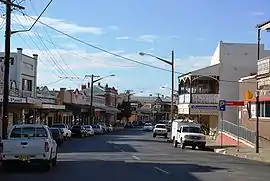 Gaskill Street, the main street of Canowindra | |||||||||
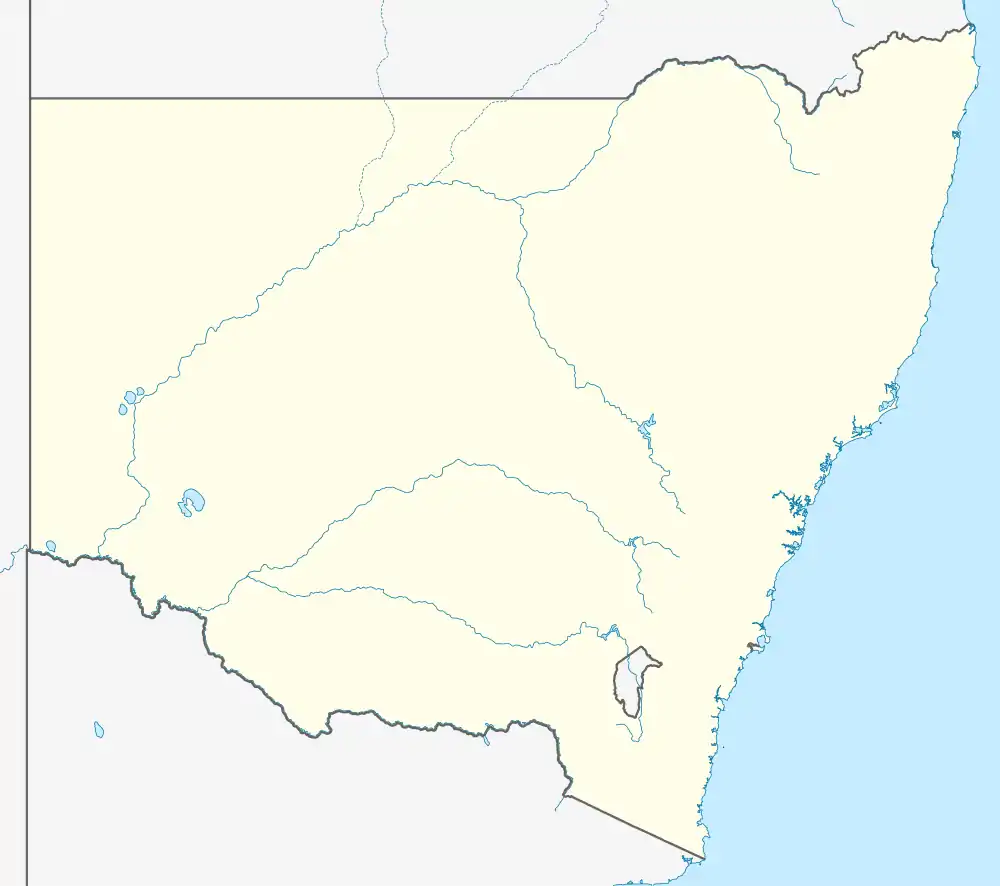 Canowindra | |||||||||
| Coordinates | 33°34′0″S 148°40′0″E | ||||||||
| Population | 2,258 (2016 census)[1] | ||||||||
| Established | 1847 | ||||||||
| Postcode(s) | 2804 | ||||||||
| Elevation | 300 m (984 ft) | ||||||||
| Location | |||||||||
| LGA(s) | Cabonne Shire | ||||||||
| State electorate(s) | Orange | ||||||||
| Federal Division(s) | Calare | ||||||||
| |||||||||
Toponymy
The name of the town is derived from an Aboriginal language (Wiradjuri) word meaning 'a home'[4] or 'camping place'.[5]
History
Prior to the arrival of Europeans to Australia, the area now known as Canowindra was occupied for tens of thousands of years by a people known as the Wiradjuri.[6] These "people of the three rivers" were hunters and gatherers who exploited the resources available in the rivers and the lands, particularly the river flats.[7]
European Settlement
The first land grant of 640 acres to a European in the area was to James Collits by Governor Ralph Darling in 1829 as a reward for "pointing out a line of road from Mt. York to Bathurst". Subsequently, Collits' father, Pierce, was granted land adjacent to the original grant.[8] There is some evidence that James (or the succeeding owner, Thomas Iceley) named the property "Canoundra". Collits owned other significant tracts of land in the area, together with a store and the first hotel. A settlement slowly grew, and as early as 1844 the village (now referred to as "Canowindra") was the site of a government pound.[5]
A post office opened at Canowindra in 1847 with mail coming from Carcoar, but the village was handicapped as part of a main route to the lower Lachlan, first by the lack of a bridge and later by the construction of the railway to Orange. The first bridge across the Belubula River at Canowindra was opened on 28 July 1875.[9] It was replaced by the Waddell Bridge in May 1901,[10] and by the current John Grant Bridge in 1997.
In October 1863, Ben Hall's gang took over the village for three days and entertained the whole population, as well as some stray travellers, all herded into the inn. An account of the incident was reported in the Bathurst Times, also quoted in the Maitland Mercury.[11] According to newspaper reports in November 1863[12] and June 1864,[13] it appears that Hall and his associates made two further visits to the town. A monument to Ben Hall, on the site of Robinson's inn, the Travellers' Rest, was erected in 1951, but evidently, further research has indicated that the events recorded here happened at the inn on the other side of the river.
Gold has been mined at Canowindra; the Blue Jacket, Grant's Reef, Blue Maxwell, and Gospel Oak Mines, were located near the town.[14]
Today the main street, Gaskill Street, has an old-world air, with its kerbside verandah posts lining the dog-leg course of what was once a bullock team track. A total of 34 buildings and features in the town and environs are listed in the New South Wales State Heritage Register including 17 in or adjacent to Gaskill Street,[15]
Built environment

- The Swinging Bridge: In the early 20th century residents of South Canowindra then a village in Waugoola Shire, agitated[16] for a bridge to be built at the end of Finn's Lane to give pedestrian access to the Canowindra business area, then situated in the then neighbouring Boree Shire. Eventually, a low-level footbridge financed by the two shires and local residents was completed early in 1928. The footbridge was washed away by a major flood event in 1934. In 1938 a new suspension bridge was built, locally known as the "Swinging Bridge". It has been modified and strengthened over the years to withstand the floods that were formerly regular occurrences in Canowindra.[17]
- All Saints' Anglican Church Designed by noted ecclesiastical architect, Louis Williams All Saints' is a simple brick church. It was partially constructed in 1927–8 in a modified Gothic mode, when the sanctuary, choir and nave were built. It was subsequently finished to Williams' original design in 1959. The building houses several distinctive stained glass windows including the vesica window designed by the European trained artist, William Montgomery.[18] One window "Jesus and the Doctors" was made by Christian Waller and installed in the 1930sand at least two windows were made by her husband, Napier Waller.
- Noojee Lea is a homestead located some 9 km south-west of the town on the Belubula River. The lands currently occupied by the house and demesne including more than 2000 hectares of rural property along Fish Fossil Drive were originally granted to Robert Read in 1869.[19] Since 1981 the owners are the family of the prominent businessman and "BRW rich lister" Charles Curran AO. There have been several iterations of the garden including a design in 2010 by a local landscaper, Sally Bourne. Subsequently, further improvements on the layout were carried out by the Melbourne landscape designer Paul Bagnay in 2015. The Curran family hold an open day at the homestead each year with proceeds benefiting the Canowindra Soldiers' Memorial Hospital.[20]
Modern Canowindra
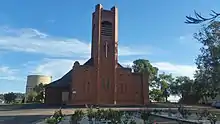
Demographics
Since early days of European settlement the population of the town has grown steadily.
| Year | Population | Notes |
|---|---|---|
| 1866 | 120 | |
| 1871 | 200–250 | |
| 1890 | 400 | within one mile not counting Belmore 154 ( Mr Dry, Railway Inquiry 1890) |
| 1901 | 416 | Year of Federation |
| 1911 | 1535 | Year after railway service opened |
| 1933 | 1716 | Great Depression |
| 1947 | 2271 | Post World War II |
| 1951 | 1747 | Both mills had closed in 1950s |
| 1966 | 1717 | |
| 1971 | 1679 | Finns Store closed 1970 |
| 2011 | 2381 | Census |
Census data for the "Urban Centre and Locality"[21] which excludes Moorbel shows that between 2001 and 2016 the numbers have reduced from 1516 to 1395. However, the figures for wider area "State Suburb (SSC)"[22] show a modest increase in the count from 2,126 in 2006 to 2258 in 2016.[23]
In the Canowindra SSC, 88.2% of people were born in Australia and 91.5% of people only spoke English at home. The most common responses for religion were Catholic 29.7%, Anglican 26.6%, No Religion 16.5% and Uniting Church 8.9%.[1]
Suburbs
There are two residential areas associated with the town: South Canowindra and Moorbel.
The "Village of South Canowindra" is a rural place located south of the Bellubula River.[24]
Moorbel is a locality about 3 km E by N of Canowindra and 4 km SW by W of South Canowindra. In February 1917, residents of Belmore petitioned the postal inspector at Parkes for a postal receiving station. Because a place named Belmore existed in Sydney, the residents submitted other names, with Moorbel finally being approved by the Department of Lands in July 1917.[25] A local market is held at Moorbel Hall each month.
Canowindra Soldiers Memorial Hospital
Located in Browns Avenue, the hospital was built as a memorial for the men of the district who served in World War I.[26] The foundation stone was laid in 1921 and the Soldier's Memorial Hospital opened, on Peace Day 28 June 1922.[27] Part of the Western NSW Local Health District,[28] the hospital has a limited number of acute and nursing home beds. The hospital also serves as a centre for various health services including rehabilitation and emergency. The emergency department was redeveloped in 2017.[29]
Education
The town has three schools: a state co-educational Years 7–12 high school, Canowindra High School, a state K–6 primary school, Canowindra Public School and St Edwards Primary School, a Roman Catholic systemic K–6 primary school.[30]
Early childhood education is provided by the Canowindra Pre-school Kindergarten Inc. (a registered association that commenced operations in 1958[31]) and registered home based educators managed by Cabonne/Blayney Family Day Care Service.[32]
Service, Social and Community
There is an active Lions Club. The branch of the Country Women's Association (CWA) which meets in its own hall with modern catering facilities was founded in 1924.[33]
A community garden which is open to all residents and visitors is managed by a local committee.[34]
The Canowindra Services & Citizens Club Ltd is a registered club providing a wide range of facilities for members and the community including a bistro and a community hall which can be hired by the public.
The Canowindra Garden Club organises talks and visits to gardens throughout the region raising money for charity. The club donated $6,000 to the Canowindra Soldiers Memorial Hospital in 2018[35]
The Canowindra Historical Society operates the Canowindra Historical Museum which is located in the town's main street next the Age of Fishes Museum. On display are a shepherd's hut circa 1828, Harold Boyd's complete dental surgery, a wedding gown collection from 1881 to 1982, a reconstructed wool shed, wheat harvesters collection from 1843, photo collection and the Pioneers Wall.[36]
Canowindra Pastoral Agricultural and Horticultural Association manages the town's showgrounds and organises the annual show which has been held since 1900.[37]
The Miracle House
When the special support needs of a local family with triplets diagnosed with a congenital form of muscular dystrophy and restrictive lung disease were identified in 2013, residents of the town and the wider central western NSW region started fundraising with the aim, inter alia, of building a house with appropriate design features for the use of the family as well as providing ongoing support.[38] A charity was registered in 2016[39] Since then hundreds of thousands of dollars both in cash donations and in kind have been raised with the family moving into their new house in March 2018.[40] In 2021 following further fund raising a hydrotherapy pool was installed at the house.
Culture
Organised by the Canowindra Fine Music Group,[41] The Baroque Music Festival is an annual presentation of baroque and related music performances at various venues around the town.[42]
The town's branch of the CWA presents a "Sunday Serenade" at All Saints Church annually which showcases local performance talent. Monies raised are used to fund music and voice scholarships for local school children.
Sport and recreation
A number of sports clubs provide facilities and organised competitions. Such sports include Rugby league (men and women's playing as Canowindra Tigers), Rugby union (Canowindra Pythons), Cricket (Canowindra Sixers), Tennis, Lawn Bowls, Squash, Golf and Swimming. For younger age groups there is a pony club which meets fortnightly at the showground and a Little Athletics centre which participates in the Central Tablelands zone.[43]
The town has a council maintained sports oval with floodlighting, Tom Clyburn Oval. At the oval there are well maintained fitness stations, basketball courts and skateboarding facilities.
A nine-hole golf course is supported by a registered club.
Cabonne Council owns and operates the swimming pool which is open from late Spring to mid Autumn.[44]
RV Friendly Town

Since 2016 Canowindra has been recognised by the Campervan and Motorhome Club of Australia (CMCA) as an RV Friendly Town™. Facilities for caravaners and campers include low cost camp sites, easy access to the retail area, access to water and a free user friendly waste dump point.[45]
Media
Radio stations Radio stations with transmissions able to be received in Canowindra include-
AM Band:
- ABC Local Radio 549 AM
FM Band:
- Hit Network 105.9 FM
- Triple M - Central West 105.1 FM
- Roccy FM 99.5 FM
- ABC Classic FM 102.7 FM
- ABC Radio National 104.3 FM
- FM107.5 107.5 FM
- Triple J (2JJJ) 101.9 FM
Television Canowindra receives five free-to-air television networks and their affiliates which are broadcast from nearby Mt Canobolas:
- ABC - ABC1, ABC2, ABC3 and ABC News 24
- SBS - SBS ONE and SBS Viceland, NITV
- Prime7 - Prime7, 7Two, 7mate, 4ME
- WIN - WIN HD, One, Eleven, Gold
- Southern Cross Nine - 9HD, 9Gem, 9Go!, 9Life and Extra
- Half-hour long regional news bulletins are broadcast by Prime7, WIN and Nine.
Subscription television service Foxtel is available in Canowindra and the surrounding area via satellite transmission.
Internet NBN FTTN internet service is available to most of the built up area of the town via a number of reseller ISPs.
Wineries
Canowindra is considered to be part of the Cowra wine region[46] which is a sub-area of the Central Ranges wine zone. There are eight wineries centred on the town, some of which offer cellar door sales.
Other
The Royal Hotel is on the site of another inn owned by Robinson and the plaque on the wall indicates present day understanding that this was the inn where Ben Hall's bushranging gang had their spree.
Other notable buildings include the nursing home, the Junction Hotel, Finn's Building, the Victoria Hotel, the former Bank of NSW and the former CBC Bank. The Trading Post, a homewares shop, won the inland tourism award for 2006.[47]
Ballooning
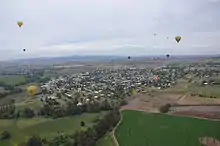
Canowindra is also popularly known as the Ballooning Capital of Australia.[48][49]
In April 1988, an endorsed bicentennial activity, "Canowindra 88 Bicentennial Balloon Championships" was held in the town.[50] The 1988 event was also the Australian National Championship under the auspices of the Australian Ballooning Federation. The champion in 1988 was John Wallington. Subsequently, the 2011, 2013 and 2014 championships were held in Canowindra.[51]
From 1995[52] to 2005, an event known as Marti's Balloon Fiesta[53] was held in Canowindra. Funded in large part by Frank Hackett-Jones, it was primarily a fun event designed to bring together balloonists and spectators from local, national and international locations in a celebration of Central West hospitality and goodwill.
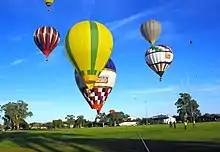
Canowindra International Balloon Challenge is the largest ballooning event in Australia and takes place in Canowindra every April. In 2010, the Canowindra Challenge created a local balloon event that has since grown to where the event now attracts pilots and balloons from around the globe to build upon the principles of Marti's Fiesta, bringing businesses together to support a week-long event of ballooning competitions and skill-based activities. The use of location-enabled (GPS), point-of-view camera technologies was combined with live-to-web broadcasts via an online streaming platform for viewers to share in the spectacle and to join in the event virtually and for free.
A balloon glow is held as part of the event along with a local food and wine market based on the 100-mile principle where the products must be made or produced within 100 miles of Canowindra. The last Sunday of the event also features a key grab where pilots test their skill in an attempt to grab a large key from the top of a 10 m pole.
This event coincides with food and wine events which brings participation from the greater Cabonne and surrounding districts during April each year. Canowindra also hosted the Australian National Balloon Championships in 2011, 2013 (awarded silver at the NSW State Tourism Awards in the Festivals and Events category[54]) and 2014, creating a larger, more competitive event. In 2014, the event went fully international with pilots from Japan, US, Russia, Brazil and the UK competing.
In 2020, the Balloon Challenge was cancelled due to the COVID-19 pandemic.[55] The 2021 event is scheduled for 26 April to 1 May.[56]
Fossils
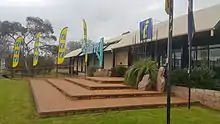
Canowindra is the site of one of the world's great fossil discoveries from the late Devonian period. A chance discovery by a road worker in 1956 uncovered a rich find of 360-million-year-old fish fossils, dating from the Devonian period in the Paleozoic era. The "Canowindra slab" was removed to the Australian Museum, Sydney. The fish had been buried when trapped in a pool of water that dried up, stranding two armoured antiarch placoderms, Remigolepis walkeri and Bothriolepis yeungae,[57] and Canowindra grossi, a lobe-finned crossopterygian fish, with two rare juvenile arthrodire placoderms, Groenlandaspis species.
No further fossils had been recovered until January 1993, when a trial dig on the site using an excavator rediscovered the fossil stratum, where the mass mortality of fishes was preserved in detail (see Lagerstätte). Specimens can be viewed in the specially established The Age of Fishes Museum, with scientific support and funding from the Australian Museum. The Canowindra site has now been listed as part of Australia's National Heritage because of its international scientific importance.[58][59][60]
In 2013 the naturalist and wildlife broadcaster Sir David Attenborough described the collection of fossils as world class.[61]
In May 2018 work started on a $600,000 facility to house the fossil bearing rock slabs currently stored off site.[62]
State Emblem
The official NSW State Fossil Emblem is Mandageria fairfaxi. The 370 million year old fossil fish from the Canowindra Fish Bed was named as the NSW State Fossil Emblem in 2015.[63]
Notable Canowindrans
- Kath Anderson - member of New South Wales Legislative Council from 1973 to 1981 was born in and received her early education in the town.
- Hubert Clement 'Butt' Finn (1900-1952) - Australian rugby league footballer of the 1920s and physician.
- Julia Finn - member for Granville in the New South Wales Legislative Assembly from 2015 brought up in Canowindra and attended St. Edwards Primary School.[64]
- Peter Fitzgerald - rugby league footballer for St. George, Eastern Suburbs and Port Kembla.
- Lisa Corrigan - Australian athletics representative, Olympic Athlete and Australian one mile record holder.
- Gordi (Sophie Payten) – recording artist[65]
- James Grant – Australian representative Rugby union footballer[66]
- Rhyan Grant – footballer currently playing for Sydney FC in the A-League
- Elwyn Lynn – artist, author, art critic and curator[67]
- Rex Norman (1891–1961) - representative rugby league footballer who played for several [NSWRL) clubs and who finished his career as coach of the town's football and cricket teams.
- Amelia Rygate – independent member of the NSW Legislative Council and spouse of Gerald Rygate
- Gerald Rygate – citizen soldier, farmer and member of the NSW Legislative Council
- Paddy Stokes - politician and publican who ran the Victoria Hotel in the 1930s
- Bishop Douglas Warren (1919-2013) - Roman Catholic cleric was born and raised in the town.
In popular culture
- From 1934 to 1936 at the height of the Great Depression, Lewis Rodd, a noted Christian Socialist and pacifist, was a teacher at the then Canowindra Central School.[68] He and his wife, Kylie Tennant, lodged at the Canowindra Hotel in Gaskill Street. It was during this time Tennant wrote her first novel "Tiburon" (first published in serial form in The Bulletin 1935) about the "suspicions and mores of life in a country town", which the author stated to have been based, in part at least, on Canowindra.[69][70] The novel won the S. H. Prior Memorial Prize in 1935.[71]
- The 1991, Inspector Morse episode "Promised Land" was set and shot in Canowindra.
- The 2015, Australian–Irish drama suspense film Strangerland featured Canowindra as the Australian desert town where characters Catherine (Nicole Kidman) and Matthew Parker's (Joseph Fiennes) lives are flung into crisis when they discover their two teenage kids, Tommy and Lily, have mysteriously disappeared just before a massive dust storm hits. This film was directed by Kim Farrant and written by Michael Kinirons and Fiona Seres.
- The 2005 action–adventure–comedy film Kangaroo Jack featured scenes from the Canowindra area as well as a scene featuring the Royal Hotel. The Royal Hotel itself was never actually used in the movie as a replica was built in studios in Sydney for the scene.
- A local Holden car collector, the late[72] Charlie McCarron, was featured in an ABC-sponsored short film project "My Back Roads"[73] talking about the sale of his collection.
- In January 2018, Canowindra was featured in the sixth episode of Series 3 of the ABC TV program Back Road.[74] The program examined the townspeople's efforts to recover from a rural economic downturn, the annual Canowindra International Balloon Challenge and the assistance provided to the Read family. The episode achieved an OzTAM capital city viewership of 599,000, outrating some sports telecasts.[75]
- In January 2018 an episode of the Seven Network's "Sydney Weekender" show was filmed in the town,[76] The segment aired in March 2018.[77]
- In April 2018, part of an episode of ABC TV's "Escape to the Country - Australia" was filmed in the town.
- In April 2018, the International Balloon Challenge Balloon Glow event was live streamed into China by Xinhua News Agency on their social media channels.[78]
References
- Australian Bureau of Statistics (27 June 2017). "Canowindra (State Suburb)". 2016 Census QuickStats. Retrieved 13 October 2018.

 Material was copied from this source, which is available under a Creative Commons Attribution 4.0 International License Archived 16 October 2017 at the Wayback Machine.
Material was copied from this source, which is available under a Creative Commons Attribution 4.0 International License Archived 16 October 2017 at the Wayback Machine. - Macquarie Dictionary, Fourth Edition (2005). Melbourne, The Macquarie Library Pty Ltd. ISBN 1-876429-14-3
- "2006 Census QuickStats: Canowindra". Archived from the original on 24 May 2018. Retrieved 24 May 2018.
- "Canowindra". Geographical Names Register (GNR) of NSW. Geographical Names Board of New South Wales. Retrieved 28 June 2009.

- "Archived copy". Archived from the original on 9 March 2018. Retrieved 15 May 2018.CS1 maint: archived copy as title (link)
- Read, Peter (1983). Home » ANU Research » Theses » Open Access Theses » A history of the Wiradjuri people of New South Wales 1883-1969. doi:10.25911/5d7784b0e7849. Archived from the original on 12 February 2020. Retrieved 14 May 2018.
- "South Western Slopes - regional history". Archived from the original on 18 August 2014. Retrieved 14 May 2018.
- "Archived copy". Archived from the original on 11 March 2018. Retrieved 2 April 2018.CS1 maint: archived copy as title (link)
- "CANOWINDRA". Australian Town and Country Journal. NSW: National Library of Australia. 21 August 1875. p. 10. Retrieved 12 July 2013.
- "COUNTRY NEWS". The Sydney Morning Herald. National Library of Australia. 16 May 1901. p. 5. Retrieved 12 July 2013.
- "Archived copy". Archived from the original on 3 April 2018. Retrieved 3 April 2018.CS1 maint: archived copy as title (link)
- "Archived copy". Archived from the original on 3 April 2018. Retrieved 3 April 2018.CS1 maint: archived copy as title (link)
- "Archived copy". Archived from the original on 3 April 2018. Retrieved 3 April 2018.CS1 maint: archived copy as title (link)
- "Gold from The Blue Jacket Mine (Belmore Mine), Canowindra, Ashburnham Co., New South Wales, Australia". www.mindat.org. Retrieved 20 September 2020.
- "Archived copy". Archived from the original on 9 February 2013. Retrieved 16 July 2018.CS1 maint: archived copy as title (link)
- "Archived copy". Archived from the original on 4 May 2018. Retrieved 4 May 2018.CS1 maint: archived copy as title (link)
- "Canowindra Footbridge, then and Now". 15 December 2009. Archived from the original on 4 May 2018. Retrieved 4 May 2018.
- "Archived copy" (PDF). Archived (PDF) from the original on 17 September 2018. Retrieved 17 September 2018.CS1 maint: archived copy as title (link)
- "Archived copy". Archived from the original on 6 October 2018. Retrieved 6 October 2018.CS1 maint: archived copy as title (link)
- "Archived copy". Archived from the original on 6 October 2018. Retrieved 6 October 2018.CS1 maint: archived copy as title (link)
- "Archived copy". Archived from the original on 24 May 2018. Retrieved 24 May 2018.CS1 maint: archived copy as title (link)
- "Archived copy". Archived from the original on 24 May 2018. Retrieved 24 May 2018.CS1 maint: archived copy as title (link)
- "Archived copy". Archived from the original on 2 August 2017. Retrieved 24 May 2018.CS1 maint: archived copy as title (link)
- "Archived copy". Archived from the original on 16 May 2018. Retrieved 16 May 2018.CS1 maint: archived copy as title (link)
- "Archived copy". Archived from the original on 5 March 2018. Retrieved 5 March 2018.CS1 maint: archived copy as title (link)
- "Archived copy". Archived from the original on 24 May 2018. Retrieved 24 May 2018.CS1 maint: archived copy as title (link)
- "Archived copy". Archived from the original on 24 May 2018. Retrieved 24 May 2018.CS1 maint: archived copy as title (link)
- "Archived copy". Archived from the original on 9 July 2018. Retrieved 9 July 2018.CS1 maint: archived copy as title (link)
- "Archived copy". Archived from the original on 24 May 2018. Retrieved 24 May 2018.CS1 maint: archived copy as title (link)
- "Home - My School". www.MySchool.edu.au. Archived from the original on 24 February 2018. Retrieved 9 January 2018.
- "Archived copy". Archived from the original on 25 May 2018. Retrieved 25 May 2018.CS1 maint: archived copy as title (link)
- Anonymous (22 June 2015). "Family Day Care". www.Cabonne.nsw.gov.au. Archived from the original on 15 December 2017. Retrieved 9 January 2018.
- "Archived copy". Archived from the original on 27 March 2018. Retrieved 27 March 2018.CS1 maint: archived copy as title (link)
- "Archived copy". Archived from the original on 27 March 2018. Retrieved 27 March 2018.CS1 maint: archived copy as title (link)
- "Archived copy". Archived from the original on 24 April 2018. Retrieved 24 April 2018.CS1 maint: archived copy as title (link)
- "Archived copy". Archived from the original on 31 March 2018. Retrieved 31 March 2018.CS1 maint: archived copy as title (link)
- "Archived copy". Archived from the original on 23 April 2018. Retrieved 22 April 2018.CS1 maint: archived copy as title (link)
- https://www.abc.net.au/news/2017-05-08/modern-barn-raising-of-hemp-miracle-house-for-triplets/8493600
- https://www.acnc.gov.au/RN52B75Q?ID=C606483C-8D87-486F-A41E-C86935CBE741&noleft=1%5B%5D
- "Archived copy". Archived from the original on 17 March 2018. Retrieved 1 April 2018.CS1 maint: archived copy as title (link)
- "Archived copy". Archived from the original on 24 May 2018. Retrieved 24 May 2018.CS1 maint: archived copy as title (link)
- "Archived copy". Archived from the original on 24 May 2018. Retrieved 24 May 2018.CS1 maint: archived copy as title (link)
- "Archived copy". Archived from the original on 31 March 2018. Retrieved 31 March 2018.CS1 maint: archived copy as title (link)
- "Archived copy". Archived from the original on 26 March 2018. Retrieved 26 March 2018.CS1 maint: archived copy as title (link)
- "Archived copy". Archived from the original on 11 April 2018. Retrieved 11 April 2018.CS1 maint: archived copy as title (link)
- "Archived copy". Archived from the original on 12 June 2018. Retrieved 6 June 2018.CS1 maint: archived copy as title (link)
- "Canowindra". Orange town and around website. 2006. Archived from the original on 7 February 2006. Retrieved 19 January 2007.
- Werner, Joel (1 April 2012). "Hot air ballooning in Canowindra". ABC Radio National website. Archived from the original on 1 May 2020. Retrieved 1 May 2020.
- "Canowindra: Ballooning Capital of Australia". Canowindra visitor information website. Archived from the original on 27 April 2006. Retrieved 1 May 2020.
- "Archived copy". Archived from the original on 30 April 2018. Retrieved 29 April 2018.CS1 maint: archived copy as title (link)
- https://www.abf.net.au/history
- http://pandora.nla.gov.au/pan/24603/20020417-0000/www.bushpoetry.com/martis/martis_page.htm
- https://web.archive.org/web/20060819205230/http://www.martisfiesta.com.au/
- "Archived copy". Archived from the original on 30 April 2018. Retrieved 30 April 2018.CS1 maint: archived copy as title (link)
- Staff (17 March 2020). "Canowindra International Balloon Challenge cancelled due to coronavirus concerns". Canowindra News. Australian Community Media. Archived from the original on 18 March 2020. Retrieved 3 May 2020.
- Chown, Matthew (20 January 2021). "Re-booted balloon festival to offer 'glimmer of hope in weird times'". Daily Liberal. Australian Community Media. Retrieved 20 January 2021.
- Other Remigolepis species have been discovered in Devonian rocks in China, Greenland and Russia.
- "The Canowindra Story – The Australian Museum and The Age of Fishes". Australian Museum. 2002. Archived from the original on 2 February 2007. Retrieved 19 January 2007.
- "The Great Devonian Fish Fossils". Canowindra.org. Archived from the original on 15 July 2015. Retrieved 19 January 2007.
- "A Unique Discovery". Ageoffishes.org. Archived from the original on 20 August 2006. Retrieved 19 January 2007.
- Nicky, Phillips. "Sir David on mission to breathe life into neglected fish fossils". The Sydney Morning Herald. Fairfax Media. Archived from the original on 7 December 2017. Retrieved 6 December 2017.
- "Archived copy". Archived from the original on 24 May 2018. Retrieved 24 May 2018.CS1 maint: archived copy as title (link)
- "Archived copy". Archived from the original on 12 June 2018. Retrieved 4 June 2018.CS1 maint: archived copy as title (link)
- Inaugural Speech https://www.parliament.nsw.gov.au/member/files/126/Julia%20Finn%20Inaugural%20Speech.pdf Archived 18 November 2019 at the Wayback Machine
- "GORDI REVEALS NEW SINGLE 'ON MY SIDE' WITH VIDEO FROM DEBUT ALBUM, RESERVOIR". Liberation. Archived from the original on 24 August 2017. Retrieved 20 July 2017.
- "Wallabies". Australian Rugby Union.
- "Elwyn Lynn". Robin Gibson Gallery. Robin Gibson Gallery. Archived from the original on 10 January 2018. Retrieved 21 July 2017.
- "Archived copy". Archived from the original on 3 April 2018. Retrieved 3 April 2018.CS1 maint: archived copy as title (link)
- https://www.dailytelegraph.com.au/a-town-like-canowindra/news-story/d8f1dcaa5f69e36988b316dcf0951b1b?sv=eaacb580e2a8ee34497a62a5a06e2f50
- Grant, Jane (2005). Kylie Tennant: A Life. Canberra: National Library of Australia. p. 26. ISBN 064227617X.
Tennant always claimed that... Triburon was an amalgam of Canowindra....
- "Archived copy". Archived from the original on 20 June 2018. Retrieved 19 June 2018.CS1 maint: archived copy as title (link)
- "Canowindra loses one of its finest citizens". CowraGuardian.com.au. 17 August 2017. Archived from the original on 5 January 2018. Retrieved 9 January 2018.
- "ABC OPEN: Canowindra's Holden car collector Charlie McCarron -- From Project: My Back Roads". open.ABC.net.au. Archived from the original on 14 May 2018. Retrieved 9 January 2018.
- "Back Roads". ABC Television. Archived from the original on 11 January 2018. Retrieved 9 January 2018.
- "Nine's A Current Affair coverage of McLachlan allegations outrates ABC's 7:30 investigation". Mumbrella.com.au. 9 January 2018. Archived from the original on 9 January 2018. Retrieved 9 January 2018.
- "Sydney Weekender stops by Canowindra". Cowra Guardian. Archived from the original on 5 February 2018. Retrieved 5 February 2018.
- "Canowindra". Sydney Weekender. Archived from the original on 27 March 2018. Retrieved 27 March 2018.
- "Glow Caps Off Amazing Week of Ballooning in Canowindra". Central Western Daily. Archived from the original on 2 May 2018. Retrieved 1 May 2018.
External links
![]() Media related to Canowindra, New South Wales at Wikimedia Commons
Media related to Canowindra, New South Wales at Wikimedia Commons
- Canowindra Visitor Information website
- Canowindra Challenge - official website
- Canowindra District Historical Society & Museum - official website
